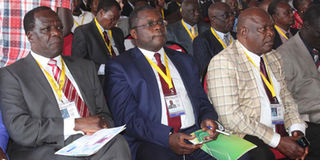Integration of policies, institutions key in county resource management

Some of the county bosses attending the 4th Annual Devolution Conference at Kenya Wildlife Service Training Institute in Naivasha follow proceedings on march 8, 2017. PHOTO | MACHARIA MWANGI | NATION MEDIA GROUP
What you need to know:
- County governments were urged to plan for better management of their natural resources while ensuring synergy with existing national policies and laws, with speakers at the conference warning of a looming catastrophe where this is not done.
- Dr George Wamukoya — a climate change expert — said clear strategies are required to manage natural resources to ensure sustainability, citing the emerging oil and gas sector as an area that could attract chaos if not well managed.
- Dr Julius Kipengetich, the Chief Executive Officer Uchumi Limited, formerly Kenya Wildlife Service Director, said county governments must actively plan for their resources given their competing needs.
Counties are still grappling with enormous sanitation challenges, with the sewerage system coverage currently standing at just 25 per cent.
Water and Irrigation Cabinet Eugene Wamalwa, while highlighting successes in promotion of access to quality water and sanitation at the 4th Annual Devolution Conference in Naivasha, said many towns are still lagging behind and still don't have proper sewerage systems.
Kakamega Deputy Governor Dr Philip Kutima on the other hand cited insufficient financing and poor infrastructure as some challenges in solid waste management in counties.
However, he said most counties are making progress in solid waste reduction through investment in clean production technologies.
Dr Kutima cited environmental committees in counties mandated to deal with solid waste management and strategies to realize the same.
The CS who was among panellists in a session that discussed progress made in the empowerment of local communities in natural resource management for sustainable development at the local level, challenged county governments to develop water harvesting and storage facilities to boost their capacity to deal with flood and drought challenges in the future. He cited the current drought situation in the country as a case.
County governments were urged to plan for better management of their natural resources while ensuring synergy with existing national policies and laws, with speakers at the conference warning of a looming catastrophe where this is not done.
Intervention measures were suggested, including county human resources management committees and strategies for the same.
HARVEST WATER
The CS said county governments must prepare for drought and floods by investing in the development of water harvesting and storage facilities.
"Currently there is severe drought and 23 Arid and semi-arid counties are crying for water and food," he said
"Climate change is a reality we must live with. The drought we are facing today is likely to be a new normal in terms of a cycle that is likely to recur," he added.
Dr George Wamukoya — a climate change expert — said clear strategies are required to manage natural resources to ensure sustainability, citing the emerging oil and gas sector as an area that could attract chaos if not well managed.
Singling out water, land, mining, marine, oil and gas resources, he said sector policies and institutions should be integrated at both the national and county government levels for proper coordination.
"Natural resources must be managed well. They must be protected in alignment with national and county policies. We are already facing challenges which when added to the challenge of climate change you can imagine what people are going through," he said. "If we don't find that synergy then obviously we are going to lose those resources," he added.
Dr Walukoya delved into existing legal instruments to support sustainable management of resources, citing policies and laws in water, forestry, wildlife, mining sectors, stating that the national government has provided the necessary policy direction and support to help manage resources for sustainable development.
PLAN FOR RESOURCES
He said that the County Governments Act was one of the instruments that were well thought out and containing provisions to help address some of the challenges in the management of resources.
Dr Julius Kipengetich, the Chief Executive Officer Uchumi Limited, formerly Kenya Wildlife Service Director, said county governments must actively plan for their resources given their competing needs.
"If they don't plan we shall have a catastrophe. Either the population or natural resources will crash because of pressure," he warned while giving an example of the current conflict in Laikipia County.
"There is a danger if systems are not put in place for proper management of the resources," he argued.
Dr Kipngetich said although the country has the necessary legislation to support sustainable management of natural resources, the relevant institutions should be strengthened at the county level to support their exploitation.
He suggested that counties should set up specific ministries to deal with the docket and develop frameworks for distribution of natural resources.
Climate change and natural resources advisor DFID Kenya Ms Sabita Thapa said beyond financial management, institutional and behaviour change was also necessary to transform management of resources at the local level.
"It is a shared responsibility where everybody has a role and must contribute," she said.




